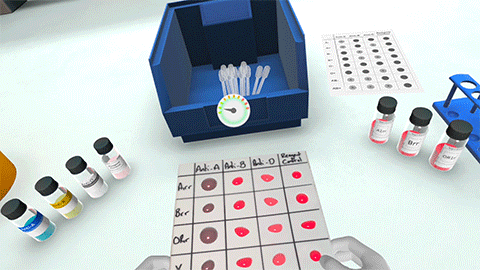
Learning with NHSBT: Enhancing Critical Skills Through Immersive Experiences
We’ve partnered with NHS Blood and Transplant to design a suite of immersive training experiences that address critical clinical procedures, safety protocols, and operational practices. These projects aim to improve learning outcomes, reduce reliance on physical resources, and ultimately support safer outcomes for donors, recipients, and staff.
Our journey began back in 2019 when we visited a lab to identify the single most powerful VR use case that could be produced rapidly and validate the use of VR across the organisation.
We worked together to create a proof-of-concept, Tile Blood Grouping. Following the success of this POC, we expanded it into…
In Blood Identification, learners gain hands-on experience in transfusion safety by administering blood and seeing the real-time physiological consequences of correct or incorrect blood type selection. This award-nominated simulation (AIXR VR Awards 2020) reinforces the importance of accurate blood matching. This app is now available on the Meta App Lab store, making it accessible to any institution such as colleges or universities, or anyone with an interest in blood transfusion science.

Since then we have worked on many more experiences with NHSBT.
Crossmatching is a simulation that enables safe, repeatable practice of the complex crossmatching process, reducing the need for real blood resources and ensuring learners understand each critical step and its safeguards. So far, doctorate research has shown from a study across 43 UK hospitals…
- Participants’ mean knowledge scores increased following VR training (50.5% to 80.3%)
- Results demonstrated a trend towards increased knowledge and perceived practical skills retention compared with traditional training.
- 90% of users recommended the training.
- And it also achieved an accolade at the AIXR Awards in 2024 for exceptional work in Medical Procedure Training.

NHSBT’s work in virtual reality has been highlighted in several articles by publications including the BBC, Biomedical Scientist and Manchester Metropolitan University.
Our most recent VR experiences cover the topics of ABO grouping and eye retrieval. The former is part of a Master’s study and the latter is the first experience that deals with human tissues.
Other work has included clean room and aseptic technique, blood donor screening, and eye retrieval. We’ve updated some of these apps to continuously improve on the user experience.
